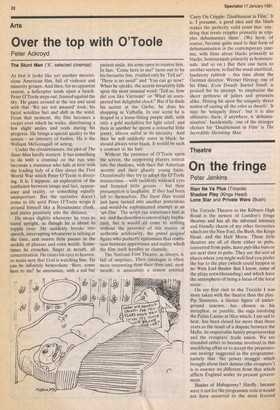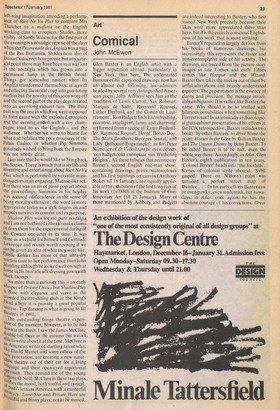Theatre
On the fringe
Peter Jenkins
Men Na Va Plus (Tricycle) Shadow Play (Kings Head) Lone Star and Private Wars (Bush) The Tricycle Theatre in the Kilburn High Road is the newest of London's fringe theatres and has all the informal intimacy and friendly charm of my other favourites which are the New End, the Bush, the Kings Head, and the Half Moon. These little theatres are all of them either in pubs, converted from pubs, have pub-like bars or are next door to pubs. They are the sort of places where you might well find you prefer the bar to the play (which could happen in no West End theatre that I know, some of the plays notwithstanding) and which have the atmosphere of being a focus of the local scene.
On my first visit to the Tricycle I was more taken with the theatre than the play. Pip Simmons, a Sixties figure of underground renown, has chosen as his metaphor, or parable, the saga involving the Palais Casino at Nice which, I am sad to hear, has been closed for more than three years as the result of a dispute between the Mafia, its respectable family proprietorship and the croupiers' trade union. We are intended either to become involved in this unedifying affair or to accept the preposterous analogy suggested in the programme. namely that 'the power struggle which brought about their demise (the croupiers') is in essence no different from that which afflicts England under its present government.'
Shades of Mahagonny? Hardly, because were it not for the programme note it would not have occurred to the most fevered left-wing imagination attending a performance of Rien Ne Va Plus to compare Mrs _ Thatcher to a mafiosa or the English working class to croupiers. Shades, more visibly, of Sandy Wilson, for the first part of the evening is a nostalgic reprise of the days when the Promenade des Anglais was a part of the Pax Brittanica. Shades here also of Bunuel's discreet bourgeoisie but any satir-. ical point there may have been to it was lost in the nostalgia which has grown into a permanent lump in the British throat. Things got somewhat nastier when les Anglais transformed themselves, in a swift and effective theatrical coup into gun-toting mafiosi but the novelty of this soon wore off and the second part of the play degenerated into an over-long cabaret turn. The third part was the one in which we were supposed to form cause with the explOited croupiers and the evening ended with a coy chamPagne toast to us the English — and the audience. Whether we were to blame for What had befallen the poor croupiers of the Palais Casino, or whether Pip Simmons. genuinely wished to bring back the Empire was not wholly clear.
I am sure that he would like to bring back the Sixties. There is much that is stylish and inventive and entertaining about Rien Ne Va Plus which is performed by versatile musician-actors in an engaging, Matisse-like set. Yet there was an air of passe pop art about the proceedings. Simmons in his heyday was accused of-decadence in the sense of being morally offensive: the word is more appropriate today as a style lingers on and emptily survives its content and its purpose.
Shadow Play was for me pure nostalgia and I am not bothered either to make claims or deny them for the experimental daring of the Coward one-acter in its time. It was done as a vehicle for himself and Gertrude Lawrence and is only worth reviving if we ean be given an idea of what they were like. stelle Kohler has more of that ultra-dry Martini taste to her performance than John Standing although he looked well enough at ,II°Me in his brocade silk dressing gown with black facings. No more than a curiosity this — an early Whisper of Private Lives — but Shadow Play IS done with elegance and verve in the l'owded theatre-dining club at the King's 'lead where it is proving a great popular success, Tap dancing is what is going to fill theatres in 1981.
„, The outstanding fringe theatre experi;neeof the moment, however, is to be had udown at the Bush. I saw the James McClure Lutthle-bill there in the autumn but wasn't "tuIe to write about it at the time. McClure is `11,11, Anierican writer of startling talent who, flutC David Mamet and some others of the 41e.w. generation, are creating a new natur:tic theatre out of their ear for a living . Plag,e and their open-eyed reportorial di) , t PI oach. They remind me of the young e'aLipktene O'Neill. McClure in these two plays ef'ehes the mood, both soulful and cynical, accPost-Vietnam America with a masterful tltacy. Lone Star and Private Wars are tiutiful and funny plays, not to be missed.



































 Previous page
Previous page